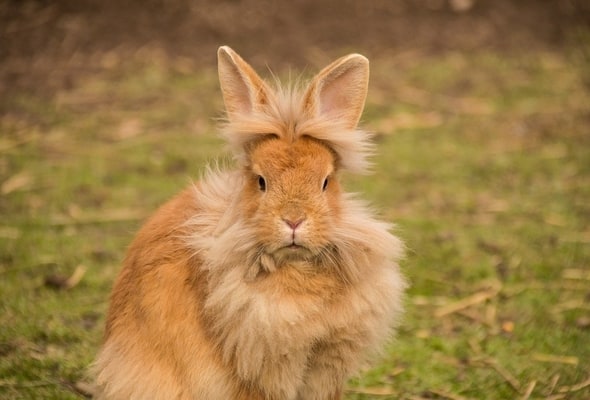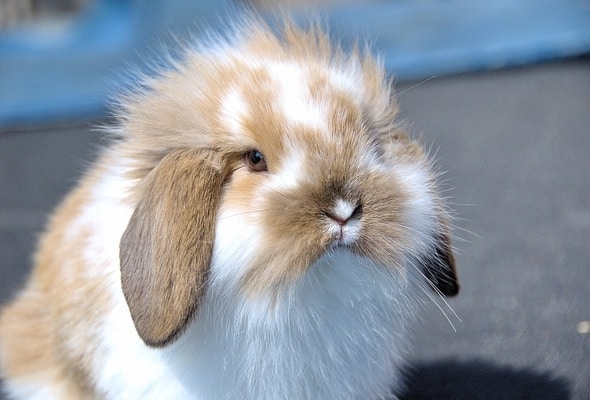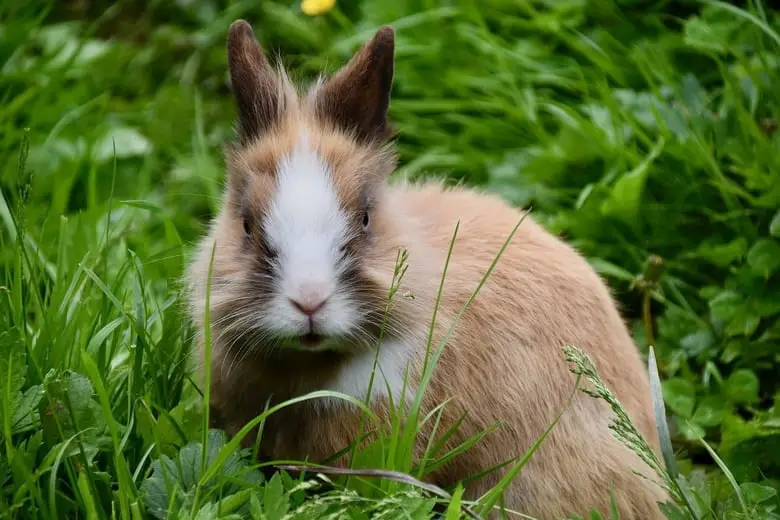If there’s one internet trend we can all be thankful for, it’s cute animal videos. Since the earliest days of the world wide web, videos of puppies, kitties, and bunnies have delighted us time and time again.
You may have seen some undeniably adorable videos of rabbits taking baths, seemingly luxuriating in the water. But wait, can rabbits take baths?
If you’re a current or prospective bunny owner, you’ve almost certainly heard that you should never bathe a rabbit. So what is the truth?
Can Rabbits Take Baths?
Under normal circumstances, you should never bathe a rabbit. In fact, there are few instances in which a healthy pet rabbit will ever require a bath. A rabbit who is medically incapable of cleaning itself may be spot-cleaned or given a shallow bath if strict directives are adhered to.
Rabbit’s fur consists of a smooth top coat and dense undercoat that is constantly shedding, which essentially makes the coat self-cleaning. The top coat evolved to protect the undercoat and skin from moisture in wet conditions, and keep the rabbit sufficiently warm.
Rabbits can tolerate a small amount of water in the form of rain, but a rabbit in the wild would never willingly submerge itself in water unless it was desperately necessary.
Swamp rabbits, for instance, will swim or hide under water if threatened but they are the vast exception to the rule. Additionally, swamp rabbits have developed an extra dense coat to prohibit the water from soaking through to their skin.
In the exceedingly rare case of a domestic rabbit who enjoys being in water (and, anecdotally, such rabbits do exist), experts advise that the water should never be higher than the rabbit’s front legs. They should never find themselves fully immersed. And, it goes without saying, they should always be closely monitored.
What Happens if I Give My Rabbit a Bath?
A rabbit facing an intensely stressful situation, such as being submerged in water, can go into shock. When a rabbit goes into shock, its body temperature falls to perilously low levels and its organs begin to slow down. The physical symptoms of shock include limpness, pale gums, cold ears, rapid breathing, and a weak pulse.

In addition, a rabbit’s fur takes an inordinately long time to dry. Bathing a domestic rabbit essentially soaks the bunny to its skin. Even if you were to dry your bunny thoroughly with a towel immediately after bathing, their coat will still trap water against their skin. This in turn weakens the skin and renders it more prone to wounds and potential infections.
Having wet fur for an extended period disrupts a rabbit’s ability to regulate its body temperature and puts them at risk of hypothermia. It is similar to a human being walking around in a wet coat they can’t take off, unable to get warm.
Can Giving My Rabbit a Bath Be Fatal?
As we have outlined, bathing a rabbit can have grave consequences, including sending them into shock, hypothermia, and even death. As previously mentioned, shock is experienced as the rabbit’s body temperature falls to dangerously low levels, and involves the systematic shut-down of its organs.

Rabbits are delicate creatures who are innately sensitive to shock, and submersion into the unfamiliar water may cause trauma too great for their minuscule bodies to recover from. Rabbits who do not fully enter a state of shock may still suffer adverse physical effects from high levels of stress.
A rabbit’s digestive system is fragile, and an increase in stress can cause them to develop gastrointestinal stasis. GI Stasis, as it is known, leads rabbits to experience severe gas, loss of appetite, lethargy, extreme pain, and low body temperature.
Additionally, since rabbits are prey animals who do not like to feel vulnerable, the panic they experience if submerged in water may lead them to thrash about and injure themselves.
Do Rabbits Need Baths?
Rabbits groom and clean themselves with their tongues, just as cats do. They lick their paws first and then use those paws to clean other parts of their bodies. As rabbits do this near-constantly, it is typically all they need to stay clean.
Your rabbit companion will need your help with hair brushing, however, and this act will not harm them.
Sometimes, health problems such as obesity prevent a rabbit from being able to clean itself in hard-to-reach places. ‘Poopy butt’ is a known complaint among owners. In this scenario, gentle spot-cleaning may be necessary.
Experts suggest dipping a towel into warm water and lightly dabbing it onto the affected area.
If a pet rabbit has a messy behind, it is important to rectify the situation as swiftly as possible. ‘Poopy butt’ can lead to flies laying eggs on the rabbit, and an infestation of larvae in their flesh.
If spot cleaning is not sufficient, it is possible to give your rabbit a safe, shallow bath if you exercise extreme caution. The optimal method for a shallow bath is to fill a sink with a few inches of warm water, just enough so that the affected area will be submerged.
Ensure you place a non-slip rubber mat or towel on the bottom of the bath to avoid injury to your rabbit if they try to escape.
Mix in a dollop of pet shampoo (never the human variety), and gently place the rabbit in the water before washing the soiled area as tenderly as possible. Take care not to wet the rabbit’s head unless absolutely necessary.
After the bath, gently towel dry the rabbit, taking care as a rabbits skin is prone to tearing. If necessary, experts say you may use a blow dryer on a low (but not cold) setting, going slowly and taking breaks frequently. Rabbits who normally live outside will need to be kept inside for at least one night, and longer if the weather is cold.
How Often Do Rabbits Clean Themselves?
Rabbits clean themselves every day, usually several times throughout the day. A certain amount of fastidiousness is normal, and an essential part of how they stay healthy and avoid the need to ever be bathed, which as we’ve learned, can have grave consequences for them.
A rabbit grooming itself is an adorable sight. They will lick their front paws, and wipe them over their nose and eyes. They will also pull down their ears to lick.
As it inevitably is with such tender, sensitive creatures, even a rabbit’s healthy self-grooming can be fraught with peril. A rabbit grooming itself may ingest a hairball, in the same way cats do.
However, there is a key difference, and that is that rabbits lack the capacity to vomit. If too many hairballs are ingested, they may clog the rabbit’s stomach and cause gastrointestinal distress and even starvation.
With this in mind, rabbits need to be brushed at least weekly under normal circumstances. When a rabbit begins shedding, however, brushings must take place multiple times a day for as long as the shedding period lasts (for some rabbits it takes weeks, for others, just a matter of days).
Rabbits have two shedding seasons per year, for their summer and winter coat. Many rabbits will have smaller shedding seasons throughout the year, and indoor rabbits may shed all year round if they do not get enough natural sunlight.
Conclusion
In summation, it is a very rare to legitimately need to bathe a bunny. Rabbits have virtually self-cleaning coats and scrupulous grooming habits.
If there is the unusual circumstance of a rabbit not being able to clean itself due to a medical condition or obesity, owners are advised to spot-clean their bunnies with extreme caution, or to give their rabbit a shallow bath as a last resort while following all recommended guidelines.
Rabbits are adorable and rewarding pets, but must always be handled with care.


